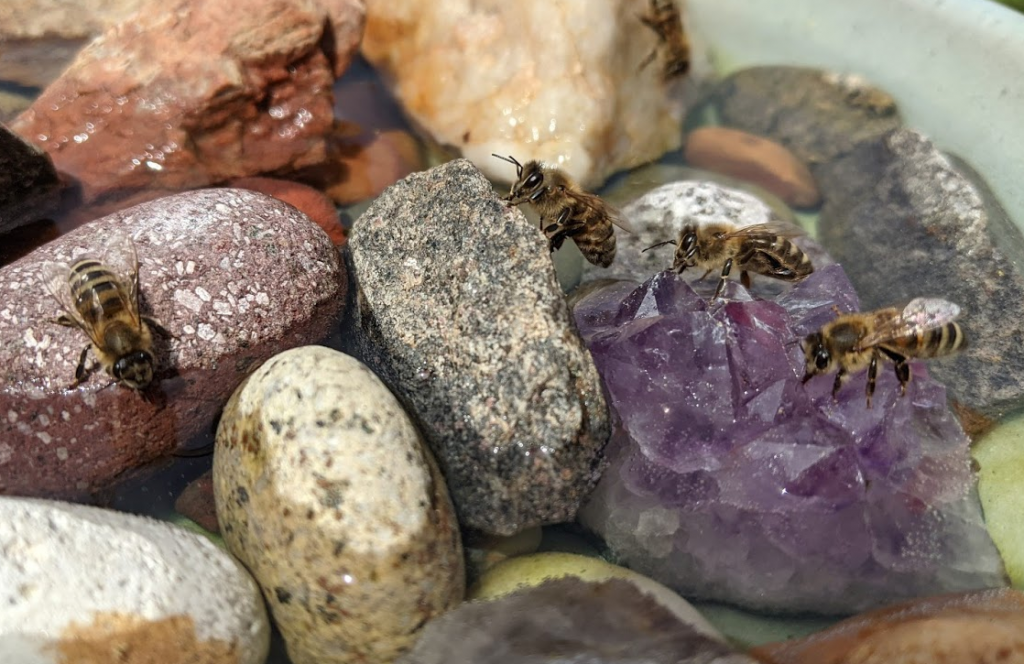Don’t get me wrong, I’m a big fan of the European honey bee, I receive tremendous joy from their tolerance of my time poking around in their hives, watching them on flowers, and swarming across the countryside (or my back yard). Yet I still have to remind myself, this introduced, invasive species was brought to North America for the benefit of humans, not the natural environment, and it’s proliferation on this continent isn’t great for the tens of thousands of other bee species also competing for resources here.

Honey Bees however are extremely valuable beyond their direct economic impact for us humans. Some beekeepers like to say every third bite of food we eat is on our plate because of the honey bee. Somehow though, before the 1600’s when Apis Melifera first arrived on the scene in the ‘new world’, the native population with their massive cities, (significantly larger than most European cities of the time) complex societies, and elaborate art/religion/rituals were able to eat just fine, and with a mostly plant based diet. So what was pollinating those crops? The native insect population of course! This is where the European honey bee, with its easily recognized economic value in honey and pollination services, (something we value, carefully track, and have therefore put a lot of time into studying) can be leveraged for a greater purpose–education about all insects.
When we first started “keeping bees” back in 2014, I quite literally knew nothing about insects and was, like many new farmers or budding gardeners focused on killing the ‘bad bugs’. As it happens the honey bee turned out to be something of a ‘gateway insect’ for me. Through learning about honeybees, I’ve also learned that 98% of insects on the planet are not considered agricultural pests, yet nearly all insects perish when hit by pesticides, and are significantly harmed as well though perhaps with a less obvious direct connection, when herbicides are used on the landscape (through the destruction of habitat, food sources, and critical microbial interactions). Twenty five percent of the known bee species around the world haven’t been seen since 1990. Wanting to learn more about the honey bee brought the plight of all insects into focus for me, and though I still grapple with the fact that every time I increase the size of our apiary, a native pollinator species faces more competition, so far the bees continue to keep themselves in our apiary, and I strive to teach everyone who expresses interest in the honeybee, about the wonders and importance of all insects species. Their activity supports us, and it just makes sense therefore, that I support them.
So What can you do?:
- If you want to help ‘save the bees’ think about the 19,999 other species that need help as well, not just the common European Honey Bee, Apis Melifera
- Support all of them by planting Native flower gardens–everywhere!
- Leave the weeds along your fence row and in your lawn, then let them bloom
- Create habitat for solitary bees by leaving the trunks of dead trees standing, and a few out-of-the-way bare patches of ground uncovered by mulch so tree and ground dwelling bees will have a place to raise their young and overwinter
- Never use pesticides/herbicides
- Make the time to have the awkward conversation with your neighbors when you see them hiring the mosquito spray truck, or squirting a dandelion with herbicide. Let them know that, no matter how much the company pushes the lie that their product doesn’t harm bees, it’s not true, and the most effective way to control mosquitos (or keep your kids from getting cancer) in any area is to have a community wide effort to eliminate standing water (and eliminate the use of anything ending in ‘-cide’…pesticide, herbicide, fungicide).
- Minimize your carbon footprint. Climate change is wreaking havoc on nature–the very systems we, insects, all life on Earth rely on for survival are in peril. The difference is, not only did we cause climate change, we have the power to reverse it–unlike the whales, turtles, insects we share this glorious planet with–we can. Every time we start our car, use the clothes dryer, ride an elevator, get on an airplane, or even leave the tap running while we brush our teeth, we contribute to the unfolding climate crisis that is happening right now. While these decisions may seem better at the time, we have to ask the question, ‘better for who’? Just us, or the planet…Every single one of us can make a significant impact by reducing our energy consumption, and contributing to sustainable, renewable, energy programs.
We’re in for a rough ride, but at the time of this writing at least, experts agree it’s not too late to make a difference and minimize the most serious consequences of our wanton and unrestrained use of fossil fuels. What are you waiting for? Get that native plant pollinator garden started today!




